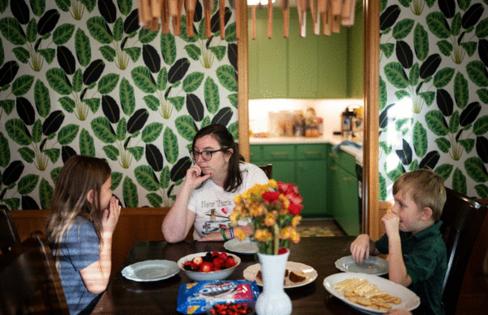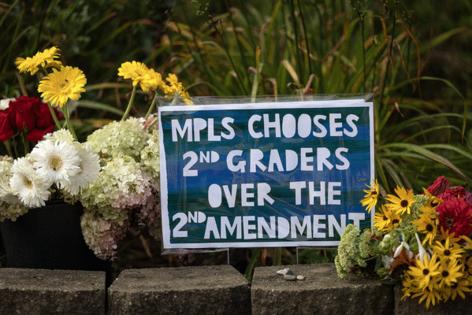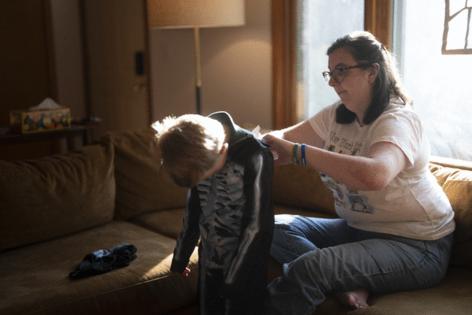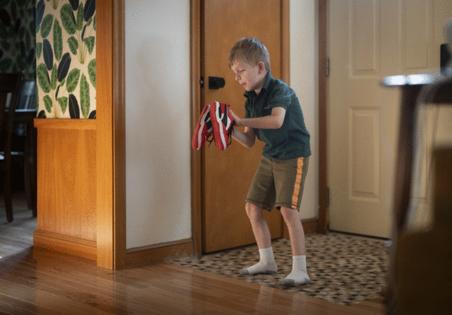Annunciation parents take up political activism in aftermath of shooting
Published in News & Features
MINNEAPOLIS -- It has been six weeks since Brittany and Joe Haeg’s 6-year-old son, David, suffered a lacerated spleen from one of the 116 bullets shot from a semiautomatic rifle into an Annunciation Catholic School Mass.
Like dozens of other Annunciation parents whose children were scarred physically, emotionally or both in the Aug. 27 shooting, the Haegs had never sought to be a voice for change in a nation’s vexed debate over gun violence.
But they want their kids to know they tried to make some good out of such a tragedy. Now they’re part of a forming coalition of Annunciation families that’s trying to fight off a creeping cynicism about the gridlocked political system in the hope that future families will be spared the same experience.
David is the Haegs’ youngest child. His life-saving surgery was only the beginning of his recovery, which has been as much emotional as it has physical. David built an Iron Man superhero LEGO figure and told his parents he wishes his teachers had blasters to keep him safe.
When he is processing big adult feelings, a stuffed police dog that investigators gave him helps answer for him. He has angry outbursts he’s never had before, his former joyfulness punctured — still there, but living alongside feelings of fear and loss that come out in unpredictable ways.
The David from before the shooting “is there in pieces,” Brittany Haeg said, “but it’s also fundamentally altered.”
Within weeks of the Aug. 27 shooting, Annunciation parents spoke at a Minnesota Senate hearing. They formed a WhatsApp group for political advocacy that’s 130 strong. They marched in protest of gun violence and visited the State Capitol. Some 60 parents showed up for an organizational meeting a month after the shooting.
Solutions to the nation’s gun violence problem have proved elusive, and many other students and their families affected by school shootings have similarly engaged in political activism as a result.
These Annunciation parents believe this time could actually bring results — perhaps because this community was tight-knit before this tragedy brought it even closer, perhaps because this politically diverse group is well-connected, well-funded and well-organized, or perhaps because Americans may have finally grown sick of this cycle.
***
Each of the families had their own pivot from mass shooting victim to political activist.
For some, the moment came the afternoon of the shooting, when school principal Matt DeBoer quoted an African proverb at a press conference: “When you pray, move your feet.”
For others, it came in an emotional speech a week after the shooting by Malia Kimbrell, an HCMC nurse and clinical care supervisor whose daughter, Vivian St. Clair, was struck by bullets in her back and arm.
“We are not OK,” Kimbrell said. “Those bullets firing through the stained glass windows didn’t care whose parents were Democrats or Republicans.”
Brittany Haeg’s decision to channel her sorrow and anger toward political change came when Vice President JD Vance visited Annunciation families a week after the shooting.
David had just arrived home after six days at HCMC. Like dozens of Annunciation families, Haeg penned a letter that school officials delivered to Vance.
“The longest fifteen minutes of my life,” her letter began, “were the fifteen minutes I waited to learn what hospital my six-year-old had been taken to after a shooter opened fire on him, his siblings, and their classmates at the first school Mass of the year.”
She wrote of failures of moral leadership in the continued inaction around gun violence. She listed hoped-for policy changes: bans on assault weapons and high-capacity magazines, funding for school safety, expansion of public hospital funding for victims of gun violence. She explained her faith: “I was raised Catholic, taught to believe that every human life carries inherent dignity ... It is our job to protect it.”
Then came Vance’s visit. What he told the traumatized parents was devastating, she said: That he wanted these things to happen less frequently. That he’d work to be more present as a father. It felt like a fine response from a stranger at a grocery store, she said. But it felt deeply upsetting from someone with power to help prevent such tragedies, she said.
Today, as shrapnel continues to work its way out of David’s body — his parents still find bullet fragments in his bed — Haeg is devastated that the world has seemingly moved on.
“We’ve just decided as a society that what happened is OK, that it’s the cost of doing business,” she said. “That’s really painful.”
***
As news cycles churn on and as a special legislative session in Minnesota seems increasingly unlikely, Annunciation families keep living with these realities: Fletcher Merkel, the blond-haired, blue-eyed 8-year-old with an infectious smile and a love for fishing with his dad, is dead. Harper Moyski, a 10-year-old volleyball player and animal lover who adored her little sister, is too. Sophia Forchas, a vivacious 12-year-old whose mother is a pediatric critical care nurse, remains hospitalized. The ripples go further: Dozens more students recovering from physical injuries, hundreds grappling with the aftermath of horror, a school and a church figuring out what to do next.
They’re not quite sure what will be next. But they pledge that a political beast has awakened.
“I don’t know if politicians know what’s coming with this strong of a community,” said Ryan Scherf, who has a seventh-grader at Annunciation. “This time feels different to me. If any community can get anything done to save kids, it would be this one.”
Their first meeting at a community center was packed. They learned about the Minnesota legislative process and the climate around state gun-control measures. They’re hoping to coalesce around goals to reach across political aisles. They’re not sure what those goals will become, but they’ve discussed measures to ban military-style rifles, high-capacity magazines and binary triggers; they’ve deliberated about increased funding for mental health services; and they’ve floated lawsuits against gun manufacturers or sellers. (Sandy Hook families did that after the 2012 mass shooting there, resulting in a precedent-setting $73 million settlement.)
“Manufacturers would change their tune awfully quick if you got a 500-family class action lawsuit of Annunciation families suing them for billions of dollars,” said Matt Tews, an attorney who has a first- and fourth-grader at Annunciation. “Regardless of any sort of morality or altruism, you have a bottom line, and the bottom line would be impacted.”
Political efforts by victims’ families after the hundreds of school shootings since the 1999 massacre at Columbine High School in Colorado have often fallen short. Instead, Second Amendment rights have expanded nationwide in recent decades.
Kacie Sharpe has a third-grader and kindergartener at Annunciation. Her third-grader was Fletcher’s best friend.
She said she’s a moderate frustrated with political debate focusing on the extremes, whether on gun control or abortion. She believes most Americans aren’t extreme.
“This is a very American problem,” she said. “America loves guns more than anybody. For me as a Christian, that’s not the message of Jesus. The message of Jesus is you lay down your life for your neighbor. Just because the Constitution says you can own a gun doesn’t mean it extends to all kinds of weapons that can lead to mass destruction.”
***
Annunciation sits near a busy intersection in an upper-middle-class neighborhood in south Minneapolis. Parents greet each other at the grocery store and shuttle their kids to sports matches together. They hold annual SeptemberFest and Dancing with Annunciation Stars gatherings.
It’s a community that transcends typical political lines: Catholic and with a large anti-abortion contingent, in one of the most liberal neighborhoods in the Twin Cities.
Parents want their faith to rally fellow Christians toward curbing gun violence.
“If you’re pro-life, you really need to be voting for gun reform,” Sharpe said.
Polling in Minnesota from before and after the shooting reveals consistent support for gun-control measures, though divides predictably fall along partisan and geographic lines.
So Annunciation parents talk about being anti-gun violence, not anti-gun. They hope to reach politicians and voters outside their liberal enclave by calling friends and family in purple districts and more conservative districts in greater Minnesota. One Annunciation mom made talking points for her 75-year-old mom to share with friends in an agricultural region.
Tess Rada’s third-grade daughter was not physically injured. But her daughter still struggles with sleep. Loud noises and flickering lights spark emotions. She rarely talks about the shooting, and she didn’t cry until Fletcher’s funeral.
Rada sees this and feels compelled to do something — anything.
“It’s a fire I don’t think is going to go out,” Rada said.
At his home near Diamond Lake about a mile from the school, David Haeg is nearly back to a normal first-grader’s life. He likes Star Wars, specifically Baby Yoda. He’s missing three teeth on top and one on bottom. He was excited when a Minneapolis police sergeant recently cleaned and returned David’s new Puma tennis shoes from the day of the shooting.
But David is scared about walking into school. He is still on physical restrictions after his abdominal surgery. “I can’t do gym or recess or the park,” he said. Doctors say he’ll be without restrictions by Halloween.
His parents battle political cynicism. Brittany Haeg wonders why restrictions on AR-15-style weapons can’t be passed. Those restrictions are broadly popular. Without the shooter having access to these types of weapons, she believes the attack may have been prevented.
“I want to be hopeful, but politically at least, I don’t know where hope sits,” she said. “Our students who’ve grown up in the culture of school shootings don’t see this as a complicated issue. That makes me hopeful. The flip side of that is it hasn’t seemed to matter that there’s broad support for these measures. Popular support only matters in so much as our legislators think it will impact their seat.”
Said Joe Haeg: “It changes back and forth for me, feeling unfortunately apathetic and then being so angry that I don’t care that this is an immovable object. If I try, at least I can say I tried. I’ll throw myself at this immovable object in any effort to make some change.”
©2025 The Minnesota Star Tribune. Visit startribune.com. Distributed by Tribune Content Agency, LLC ©2025 The Minnesota Star Tribune. Visit at startribune.com. Distributed by Tribune Content Agency, LLC.














Comments